Liturgy
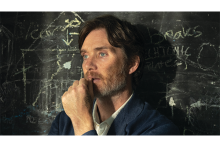
Teachers’ Mounting Pressure
The tight, gritty drama Steve offers an intimate look at a last-chance reform school in the 1990s. As determined head teacher Steve (Cillian Murphy) slowly unravels, we are reminded that we can’t take care of others until we take care of ourselves. Netflix
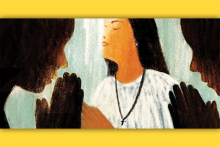
There are prayers shouted into steering wheels
in the seconds between heartbreak and red lights.
Some bargain like hagglers in a storm,
others are pure surrender.
And then, there are those that say only: please.

Two queer pastors, Anna Blaedel and M Jade Kaiser, were having dinner together in 2017, when they posed a question to each other in the spirit of meaningful fun: What would it be like if they could create a public space for conversations about and liturgical resources for transformation, at the outer margins of Christianity and beyond?

Rabbi Dean Shapiro recalls considering the future as he looked down at a baby’s head while giving her a Hebrew name and welcoming her into the covenant of Israel. She was born into a megadrought in Arizona that is only getting worse. As one infant after another is welcomed into his congregation, he finds himself reflecting on their future well-being amid a growing climate emergency. If this child spends her entire life in Phoenix, she could experience 146 days each year with a heat index topping 100 degrees by the time she reaches 30.
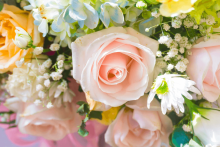
On Mother’s Day in many congregations across the U.S., churches will hand out flowers, host breakfast and tea, or offer applause for women in attendance. While the goal is to honor women and mothers, Elizabeth Hagan, a minister at Georgia’s First Christian Church Athens and author of Birthed: Finding Grace Through Infertility, told Sojourners that the celebrations can cause discomfort, pain, or even disillusionment for many in the pews.

When my husband and I started fertility treatment, we intentionally stopped going to church. Due to various traumatic religious experiences, we had been floating for over a year and we remained undecided on whether belonging to any religious organization would be part of our future. Then we went to a church service on Father’s Day weekend. Belting pop songs about the joy and goodness of God was already too much. But then they asked all fathers to stand and it broke us. Around this time, we alerted a small group of people that we were beginning fertility treatment and taking a break from church service.

FOR THE MILLENNIAL founder of a viral social media account, Cole Arthur Riley is surprisingly unplugged. “This is a fun fact that most people probably wouldn’t guess,” she told Sojourners in June, “but I actually don’t have a smartphone.”
Riley is the creator and curator of @BlackLiturgies, an Instagram profile and social media “space where Black spiritual words live in dignity, lament, rage, and liberation to the glory of God.” It is where, until this fall, she posted almost daily the liturgies she writes: Liturgies for Ma’Khia Bryant, Breonna Taylor, Ahmaud Arbery, George Floyd. Prayers of remembrance for the Tulsa Race Massacre. Invocations for those living with chronic illness and those struggling with anxiety. @BlackLiturgies goes beyond the usual liturgical calendar of Advent, Christmas, Lent, Holy Week, and Easter, embedding that rotation within a larger grammar of spiritual expression for Black survival and thriving.
Riley’s liturgies look and circulate like memes, but trade humor for a holiness rooted in the embodied knowledge and sacred truth of Black life. The bricolage of written prayer, quotations, scriptures, poetry, and statements in white text on brown, green, and blue backgrounds gained thousands of likes and reposts within hours. If you are on social media, the images are likely familiar, but the person behind them, and her story, less so.

Every year from Dec. 16 to 24, Las Posadas begin in many Latin American countries and immigrant communities in the U.S. Roughly translated, posadas means “inn” or “shelter.” Las Posadas recalls the events in Luke’s Gospel leading up to Jesus’ birth. It’s a Catholic Christian observance with a sung liturgy that’s performed on the streets rather than in church.
A posada begins with a street procession that reenacts Mary and Joseph’s search for shelter at an inn. Those playing the protagonists of the story, Mary and Joseph, are dressed in costume and carry candles as they follow along a prescribed route, knocking on doors. At each door they ask, through special posada songs, for room at the inn. In rural areas, Mary may even ride on a donkey.
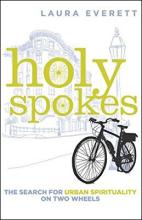
I LEARNED HOW to bike relatively late in life. I was 23, and it cut my commute in half. Since I’d been walking an hour each way for a night shift that started at 11 p.m., that meant a lot. My guru was an elder from my local church who lived across the alley. He taught me how to change a tire, gears, and my life. He showed me hospitality by teaching me about my bike, but it extended much further than that.
UCC minister Laura Everett does much the same thing in Holy Spokes . She uses the metaphor of a bike as a lens to discuss the broader issues of how to relate to people, the Earth, and God: Mostly how, to use Brother Lawrence’s term, to practice the presence of God.
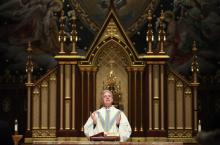
It has also been five months since Myers suspended me from all priestly ministry, for my “disobedience” in continuing to be involved with that same work against LGBT discrimination.
That’s given me a lot of time to think about what would happen when a new archbishop came to Newark, and what my future would be.

Orange isn’t a traditional liturgical color in the Episcopal Church.
But on Sunday, June 5, Episcopal clergy across the country are planning to wear orange stoles as a stand against gun violence, inspired by the Wear Orange campaign.

This summer I had the distinct privilege of being asked to serve as the Liturgical Coordinator for the Wild Goose Festival held in Hot Springs, N.C. The festival is a time and place of celebrating the “intersection of Spirit, Justice, Music, and the Arts” that began a few years ago. As such, liturgies abound. Some of them were rather traditional. The Episcopal tent, for example, held Compline services every night. They also broke out of the mold and hosted a songwriter circle and an agape feast. The Goose is like that. Ask the Methodists about the beer tent. Oh, and the Baptists had a coffee shop.
People break from the mold a little. There was a Eucharistic liturgy where a blacksmith literally hammered a rifle into a farm implement. It was an unusual Eucharist, to be sure, but beautiful.
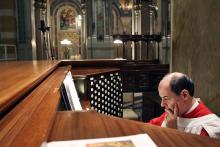
The head of liturgical music for the Archdiocese of Philadelphia, who was also to play a key role orchestrating the huge outdoor Mass concluding Pope Francis’ trip to the U.S. in September, is resigning his post over long-standing differences with Archbishop Charles Chaput.
John Romeri, who has headed the archdiocesan liturgical music office for five years, said that he will resign effective June 30 because “there are simply irreconcilable differences” with Chaput over the role and style of music at Mass.
Romeri did not respond to requests for comment, and it was unclear whether he would still play a role in preparations for the papal visit.
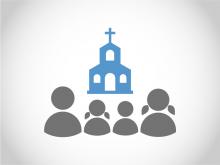
When did you last think about the relationship between your community's worship practices and their missions? It's such a loaded conversation. What makes for "mission?” Why do we set the two practices — what we do in worship and what we do after — at odds with one another? Is it simple geography? One happens behind the ecclesial closed doors while the other is more public? I want to know when we lost the sense that our liturgies were public events rather than secret rites. But that's another post.
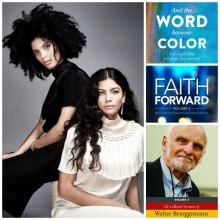
Contemporary History
The duo Ibeyi are Naomi and Lisa-Kaindé Díaz, 19-year-old French-Cuban twins with Yoruba roots—a West African culture transplanted to Cuba during slavery. Ibeyi’s self-titled album begins and ends in prayer; in between is a fusion of English and Yoruba, minimalist piano and percussion, jazz and hip hop. XL Recordings

THE SEASON AFTER Pentecost is a challenge. Some churches call it “ordinary time.” This is where most of our life is lived, spiritually speaking. The fact that other churches call it “the season after Pentecost” reminds us that a miraculous tongue of fire is needed for any sermon to work—and the Holy Spirit has a tongue of fire for us. Pentecost propels us through ordinary time. The Holy Spirit can take as sorry a lot of losers as the ones Jesus chose as disciples and turn them into apostles, martyrs, world-changers. God has always done more with less-promising material.
A retreat at a monastery gave me a glimpse of what ordinary time means. By the time 8 a.m. Mass rolls around, we’ve already been in church three times that day. Mass is beautiful, we leave buoyantly, the Trappist monks are nearly chatty. Then the bell rings. It’s time for Terce, another hour of prayer. That bell sets me to sighing—weren’t we just in church? Terce is like the Sunday after Easter or Christmas—a letdown. Same building, half full of people, and with a quarter of the energy. And it is precisely then that it’s important to worship God. The church’s worship of God carries on when we’ve all gotten bored or tired. Such worship is good for souls. Preachers’ souls included.
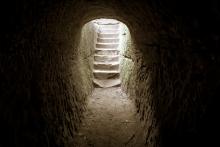
I’ve celebrated Easter before. My whole life I’ve dressed up, colored eggs, gone to church.
But this year was different. This year, I realized resurrection.
I’m not sure how the realization came.
Maybe it came because this was the first time I gardened. My mother once said, “Gardening is prayer.” I never believed her until I physically saw the transformation of dead earth into mustard greens and zucchini plants. I never realized how good the pulse of the sun felt on my back after months of gray. I never saw seeds push through the darkness of soil and become new life — until this year, when I realized resurrection.
Maybe it came because this was the first time I’ve ever felt depression. This winter was the first time there were no windows in the tomb. The first time I held myself crying in the shower wondering if the emptiness would stop. This year was the first time I saw Lent as a season to sit in deep sadness. The first time I realized that Mary Magdalene sat at the tomb simply because she was just so sad.
Maybe it came because this was the first time I’ve fully embraced a Christian community. The first time I’ve intimately walked through the liturgical season with the same people. The first time I shared the miracle of Christmas and the deep sadness of Lent in the eyes of other vulnerable humans. The first time I’ve attended an entire week of Holy Week services. The first time I sat in the dark on Good Friday after service ended and cried.
This year, I realized resurrection and I’m not exactly sure why.
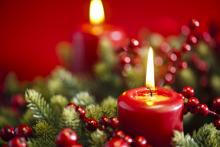
The high liturgical seasons of Advent and Lent have always held a special place in my heart because of their emphasis on the life, death, and resurrection of Christ. But Advent has special significance because it, unlike any other season, most accurately expresses the now-not-yet feeling of the Kingdom of God. It highlights the fact that we are waiting. We’re waiting for the return of God, for the day when God will come and restore all things.
Many of our Advent hymns capture this beautifully, especially “O Come, O Come Emmanuel.” Before the birth of Christ, God’s people lived in a time of waiting. The space between the Old and New Testaments, between Malachi and Matthew, cover a span of more than 400 years. That was 400 years without a word from God, without a prophet. It was 400 years of one invasion after another as one conqueror overtook another. And the people began to wonder, “When will YHWH come? When will God send the Promised One?”
And then, announced by shepherds and angels, and greeted by Magi from the East, Jesus was born in Bethlehem. The Promised One had come! The Kingdom of God was at hand! But not quite. He lived, he died, he rose again … but we’re still waiting. We live between the two great Christ events of history, between his first coming and his second. We live in the in-between time as we await the return of the King and the day when God will come again to dwell with God’s people, to wipe away every tear, and to finally and for all eternity make everything new (Rev. 21).

If you’ve been reading our blog or have checked your iTunes last week you’ve noticed the power couple of Steve Jobs’ ghost and Bono working together again. (Anyone rememberthe U2 iPod?) I’ll leave it up to music critics to debate the musical quality of the album and the potential violation of the now infamous iCloud downloading music for each Apple user. But there is one other issue to discuss regarding the U2’s recent release: God.
In a recent article published by The New Yorker, author Joshua Rothman takes an in-depth look into the spirituality of what some would call the world’s most popular rock band. Throughout the years, Bono’s religious roots have not been a secret. Books such as Get Up Off Your Knees: Preaching the U2 Catalog and We Get to Carry Each Other: The Gospel according to U2 have been published within the last decade. The Archbishop of Canterbury has addressed Bono in lectures and Bono has preached at the National Prayer Breakfast.
One of the most interesting aspects of Rothman’s article was the citing of “churches around the world celebrating U2charists.” Churches as far as the Netherlands, Austria, Mexico, and as close as Iowa, Baltimore, and Maine have celebrated U2charists, a communion service accompanied by U2 songs in lieu of traditional hymns. Rev. Paige Blair, of St. George’s Episcopal Church of Maine, was one of the first religious leaders to host such a service. According to Rev. Blair:
“the liturgy itself is pretty traditional — it has all the usual required elements: a Gospel reading, prayers, and communion from an authorized prayer book. The music is really what is different. And yet, not so different. It is rock 'n roll, but it is also deeply and overtly spiritual.”
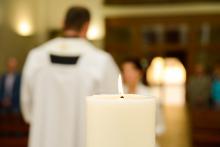
Churches flung open their doors on September 11, 2001, and people gathered on that day, and for some days later. There was a draw to sacred space in the midst of our everyday space being turned into dust–profane, unholy, hollowed out. The liturgies I attended in those days that followed were stripped down, bare, and profoundly vulnerable. The psalms were prayed. People wept together. We clung close. We resisted asking questions of meaning, and allowed ourselves to grieve, to lament.
A lot fewer churches flung open their doors on September 11, 2002. And even fewer today. The gravitational pull to gather in sacred space has waned. And it has become impossible, for the most part, to disentangle our liturgies from our politics. No longer gathering together out of unvarnished need for the divine presence, some of us gather now precisely to ascribe meaning to the unfathomable through the inextricable linking of nationalism with religion.